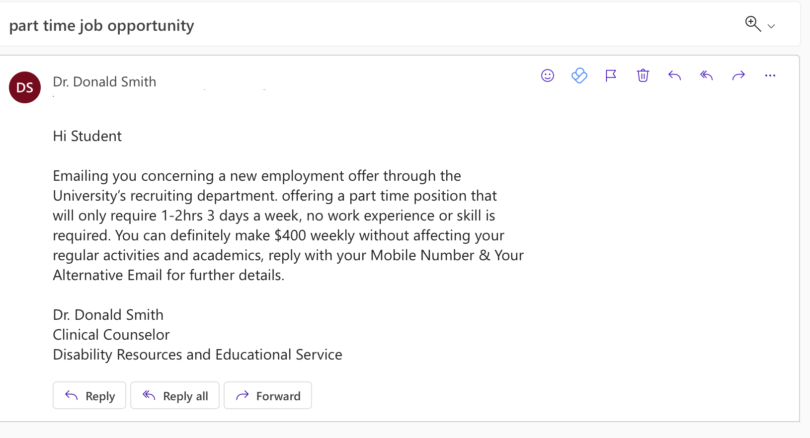Picture that you just received an email offering a huge “job opportunity” with minimum hours and high pay. As a college student you like those odds right? You might even want to respond to the sender asking to know more. However, this is the very last thing you should do.
While most wouldn’t think that outside internet scammers could reach Bluffton University; that assumption has led to quite a different outcome. More recently, there has been an influx in students receiving scam emails and a recently new mystery, text messages.
“Scams and junk emails are actually a common thing, especially with schools and organizations where you have a network of emails,” said Claire Clay, director of public relations. “Normally you just ignore them because they go to our junk folder. But sometimes they slip through and get into our inbox.”
Students, faculty and staff have been receiving emails saying there are job opportunities, online orders, your account is about to expire and so on and so forth. Some have fallen for these emails.
“Increasingly, scammers are taking the time to do social engineering to learn about who they are trying to target,” said Art Shelly, assistant professor of computer science and network manager. “They try to make individuals really feel like it is coming from the inside so they automatically trust that message.”
These scammers are in search of victims’ banking information or credit card numbers. The best thing to do is to have an unhealthy amount of distrust. When you are unsure of an email, don’t click any link associated with the email.
Shelly suggests that you take this distrust one step further if you are worried and check in your web browser. For example, if you get a suspicious email from what you think is your bank, go to your web browser and sign into your account from there. Then check your status from there.
It is also important to not trust phone numbers coming from within the email. Scammers hope for you to call that number in distress so you can give any information they are looking to receive. It’s best to not trust that number within the email, but instead look it up.
The last thing you’d want is for your account to be compromised.
“The last line of defense is educating the users whether that is students, faculty or staff to get into the mindset that if they receive a message and think about how to respond to it,” said Shelly.
As far as a student receiving a text message from someone claiming to be Dr. Jane Wood, president, still remains a mystery. A student receiving a text message from a personal cell phone number was something Bluffton hasn’t seen yet. Shelly said that the account had been compromised from an outside source, even after a two-factor authentication.
“If students could figure out ways to better educate each other I would be very excited to see those kinds of things,” said Shelly. “We want to figure out the best way to educate both students and faculty with this on-going challenge.”
If you receive any more emails forward them to helpdesk.edu which will allow the team to look into it and block the sender. If you receive a suspicious text message claiming to be faculty or staff from Bluffton; that you’re unsure about, reach out to your RA or Claire Clay.
One last word of advice is, don’t believe everything you see, change your passwords and ask yourself: does it make sense to get this or is it too good to be true?







